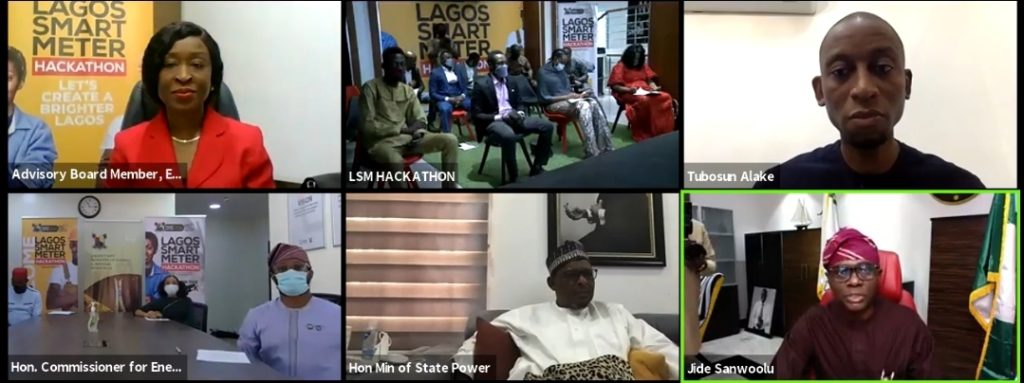The Lagos State government in collaboration with Eko Innovation Centre, today launched what it tagged the “The Lagos Smart Meter Hackathon 2020”, a Smart Meter Initiative aimed at addressing the metering gap in Lagos and by extension Nigeria.
The initiative, which was launched through the Lagos State Ministry of Energy & Mineral Resources, was unveiled by the Governor of Lagos, Babajide Olusola Sanwo-Olu and the Honourable Minister of State, Federal Ministry of Power, Goddy Jedy-Agba; along with other government officials at a virtual press conference.
Speaking, Mr. Sanwo-Olu noted that the launch marks a significant milestone in the implementation plan of the State Government towards improving access to electricity in the state and it is also in line with the Sustainable Development Goal 7 of the UN which aspires to drive universal access to affordable, reliable, sustainable, and modern energy for all by 2030.
“This Lagos Smart Meter Initiative is an important way for the Lagos Government to demonstrate its commitment to improving electricity access and reliability for Lagosians. We believe that adequate metering of Lagosians and in turn Nigerians, would increase willingness to pay for electricity, improve productivity, and more importantly, continue to improve the living conditions of our people,” he said.
He called on all relevant stakeholders, including electricity sector players, technology experts, investors, regulators to support the Lagos Smart Meter Hackathon 2020, stressing that it will ensure sustainable electricity for all in Lagos.
Also in a keynote address, Ministry of Power, Goddy Jedy-Agba explained that local design and production of affordable meters will be transformational for the industry and the economy at large and therefore urged all to support it.
“Lagos is an important state in Nigeria in terms of size, economy and resources. With a population of over 20million and the 5th highest GDP in Africa, Lagos is by far the biggest economy in Nigeria. Therefore, getting access to electricity right in Lagos is critical for access to electricity in the entire country.
He emphasized that electricity is an essential service. Thus, the government wants the benefits of smart meters to flow to everyone.
Similarly, the Commissioner for Energy and Mineral Resources, Mr. Olalere Odusote said the initiative is expected to provide access to affordable smart meters for Lagosians to improve electricity supply, monitoring, and trust between electricity providers and end-users while preventing revenue leakage. It is also expected to drive innovation and creativity while generating new interest in young people for the sector.
“Over the years, despite significant investments and resolutions around power generation and distribution, there remains a huge metering gap of over 60% of electricity consumers in Lagos and Nigeria. This metering gap is what we are seeking to bridge through the Lagos Smart Meter Hackathon”.
Doja Ekeruche, Advisory Board Member, Eko Innovation Centre explained that a call for application has been sent out to local talents in the tech community to submit their proposed hardware and software solutions using the guidelines stipulated on the Lagos Smart Meter website. All concepts will be assessed based on strict but transparent criteria to identify the most viable concepts proceeding to the next stage.
Furthermore, she highlighted that, “Judges with knowledge and expertise within power and tech ecosystem will review the entries and shortlist teams to proceed to the hackathon event. Final Winners of the Hackathon, in both the hardware and software categories, will win N7million. They will also be a part of the co-creation phase with other experts, and then proceed to the production and testing stage before the full commercialization of the smart meter”
Other participants at the event included the Deputy Governor of Lagos State – Dr. Obafemi Hamzat; Olatunbosun Alake, Special Adviser to the Lagos State Governor on Innovation and Technology; other Commissioners, Special Advisers and Heads of Parastatals from the Governor Sanwo-Olu administration; key representatives from the Energy and Technology Industry, journalists and other stakeholders.


